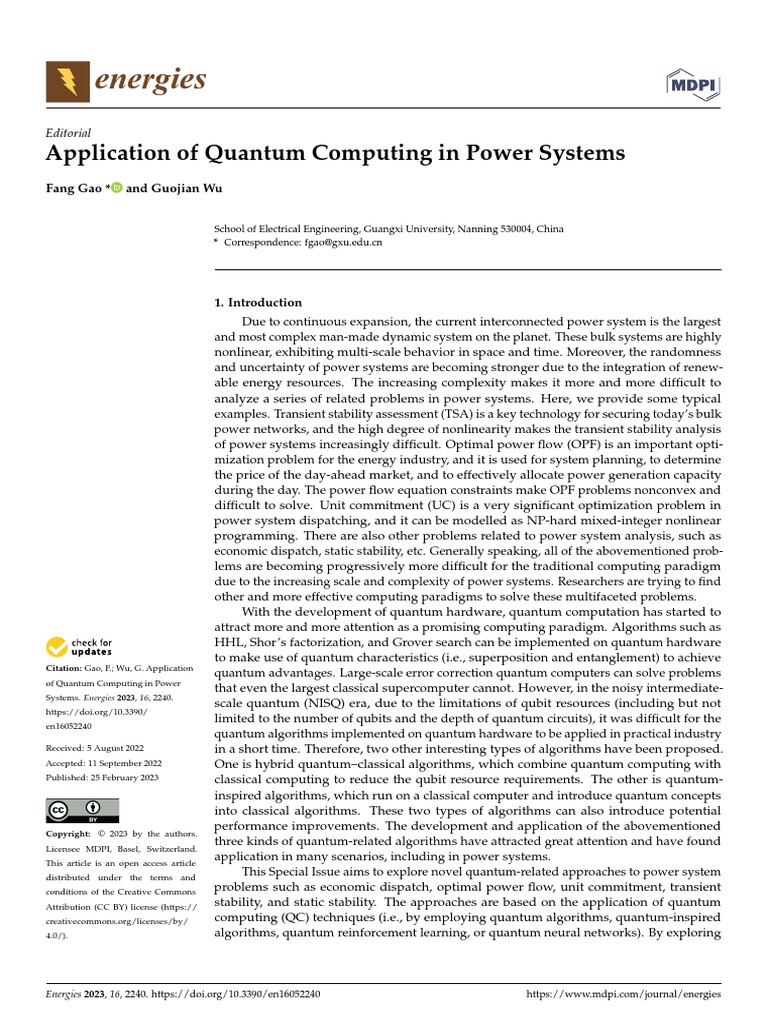As we stand on the precipice of a new era in computational science, the allure of quantum computers captivates the imagination of researchers and technologists alike. These remarkable devices, operating on principles derived from quantum mechanics, possess the potential to revolutionize various fields. The applicability of quantum computing stretches far beyond theoretical musings—its implications permeate through diverse sectors, propelling humanity toward unprecedented advancements. This article delineates the multifaceted applications of quantum computers, ultimately shaping the landscape of the future.
At the heart of quantum computing lies the qubit, a stark departure from the classical bit, which is merely binary. The qubit, capable of existing in numerous states simultaneously due to the phenomenon of superposition, unlocks the door to exponential computational power. Coupled with the peculiarities of entanglement, these attributes enhance processing capabilities in ways previously deemed implausible. The applications that emerge from these principles are both vast and profound.
1. Drug Discovery and Molecular Simulation
The pharmaceutical industry stands to gain immensely from the capabilities of quantum computing. Traditional drug discovery involves laborious simulation processes, often taking years, if not decades. Quantum computers can model complex molecular interactions through quantum simulations, expediting the identification of potential pharmaceuticals. With the ability to consider multiple configurations of compounds simultaneously, quantum computing could catalyze breakthroughs in curing diseases that have long plagued humanity, such as cancer and neurodegenerative disorders.
2. Optimization Problems
Optimization problems arise in various fields—from logistics to finance. In essence, they involve finding the most efficient solution among a myriad of potential options. Classical computers struggle with these challenges due to combinatorial explosion; however, quantum algorithms like the Quantum Approximate Optimization Algorithm (QAOA) offer innovative solutions. These algorithms can produce near-optimal solutions in significantly reduced timeframes, transforming industries such as supply chain management, urban planning, and even traffic control. Envision a world where quantum-driven algorithms streamline our transport systems, leading to reduced carbon footprints and enhanced urban livability.
3. Artificial Intelligence and Machine Learning
Artificial Intelligence (AI) has garnered attention for its transformative potential, yet it often requires vast computational resources for training complex models. Quantum computing promises to elevate machine learning capabilities through quantum-enhanced algorithms, enabling faster data processing and more intricate data analytics. Quantum algorithms can uncover patterns and insights from colossal datasets, facilitating advancements in areas such as natural language processing, image recognition, and predictive analytics. AI, enhanced by the powers of a quantum framework, promises an exhilarating future where machines learn and adapt with unprecedented efficiency.
4. Cryptography and Cybersecurity
As digital data proliferates, so does the importance of robust cybersecurity measures. Quantum computing poses a dual threat in this domain; on one hand, quantum computers could render existing encryption methods obsolete, while on the other, they inspire the development of quantum cryptography—an intriguing solution to cybersecurity threats. Quantum Key Distribution (QKD) utilizes the principles of quantum mechanics to enable secure communication channels that are theoretically immune to eavesdropping. Through the use of entangled particles, information can be shared in a manner that any attempt at interception will alter the states and reveal the presence of an intruder. The future of secure communication, therefore, is inextricably linked with the evolution of quantum technology.
5. Climate Modeling
The complexities of climate change demand sophisticated models capable of simulating multifactorial interactions within Earth’s systems. Classical computational methods often struggle to provide the granularity required for accurate climate predictions. Quantum computers, by virtue of their processing capabilities, may enable the development of advanced models that can simulate atmospheric phenomena, ocean currents, and ecological changes with greater fidelity. Such advancements are not mere academic curiosities; they serve as crucial tools for policymakers striving to mitigate the impact of climate change and bolster sustainability efforts.
6. Financial Modeling and Risk Analysis
The financial sector is an arena suffused with uncertainty and risk. Quantum computing can enhance financial modeling by allowing for the evaluation of multiple risk factors and market conditions simultaneously. Through quantum algorithms, investors can more accurately model complex financial products, optimize portfolios, and assess risks in real time. The sophisticated computations facilitated by quantum technologies have the potential to redefine risk management strategies, amplifying both efficiency and precision in decision-making processes.
7. Telecommunications
The telecommunications industry stands at an inflection point where the alignment of quantum computing with telecommunications technology can yield powerful synergies. Quantum networks could redefine data traffic security and enhance the capacity of data transmission. Quantum repeaters, for instance, may facilitate long-distance quantum communication, enabling instantaneous sharing of information across the globe. The implications for secure communication networks are profound and pave the way for a new generation of interconnected systems.
8. Space Exploration
As humanity strives to explore the cosmos, quantum computing finds its place in the toolkit of space exploration. The immense computational requirements for simulating space phenomena, optimizing flight trajectories, and processing data from distant explorations can be met with quantum technologies. The landscape of astrophysics, planetary science, and cosmology could undergo a transformation, driven by the algorithms that harness the peculiarities of quantum mechanics. Quantum computing thus illuminates the pathways to the stars.
In summary, the applications of quantum computing span an expansive spectrum—from health care to finance, environmental science to secure communications. As this technology continues to mature, its role in reshaping our world cannot be overstated. The forthcoming era of quantum computing embodies a symphony of potential, wherein challenges can be met with innovative solutions, ultimately crafting a narrative that intertwines human ambition with the enigmatic beauty of quantum mechanics. The future promises a realm where the boundaries of possibility expand, illuminating new horizons and awakening the quest for knowledge in our pursuit of progress.












